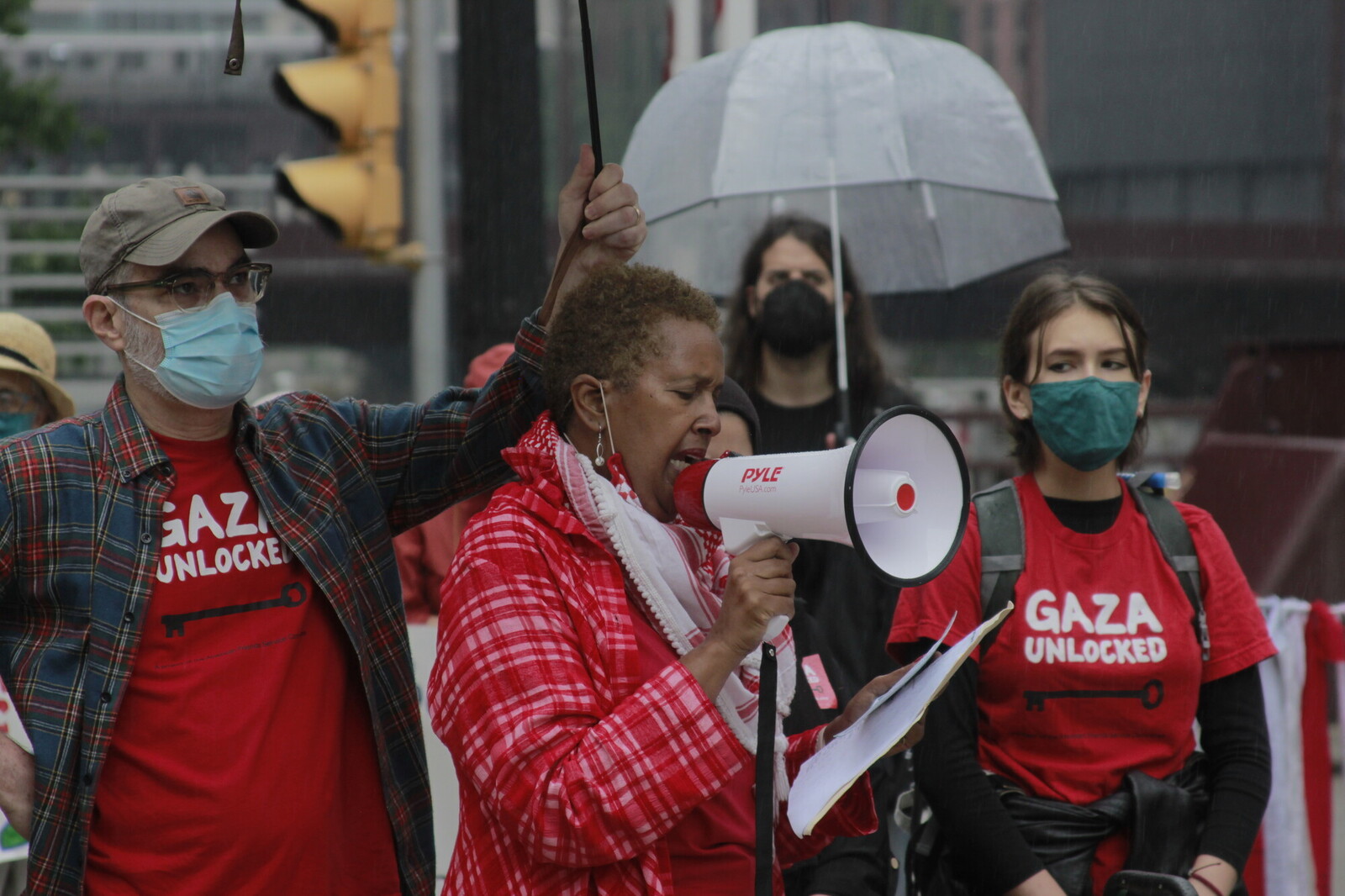
#GazaIsPalestine action in downtown Chicago. Pictured: Rabbi Brant Rosen, activist Paula Roderick, and the author daughter, Mia. Mohammad Khier
“It was very emotional, mom,” my 17-year-old daughter, Mia, admitted, tears welling in her eyes. “There were a number of times when I knew that I had read the names of entire families.”
My daughter and I had just taken part in the demonstration for The People’s Inquiry: #GazaIsPalestine launch. We were there to honor and remember the names of each of the 258 Palestinians killed in the Israeli attacks on Gaza in May.
Our memorial was signified with streaming ribbons, along with a children’s wagon full of red, green, black and white carnations. Our group—ranging from a teenager to retired individuals—included a few Palestinians (including myself), Muslim and Christian; churchgoers; students; and members of Jewish congregations.
We gathered in solidarity, beginning at Federal Plaza with a letter to Senators Tammy Duckworth and Dick Durbin. We traveled to Boeing Headquarters. The corporation supplies Israel with weapons to enforce their military occupation, colonial settler project, human rights violations, and disproportionate retaliatory violence against the people of Gaza.
As we marched from one location to the next, a line of Chicago police officers on bicycles began forming, escorting us. Upon arrival, however, their bikes barricaded Boeing’s headquarters. We stood directly across the street, conscientiously assembled on public sidewalks for our action and livestream with the Adalah Justice Project as they presented their webinar.

Through social media, our protest in Chicago reached people on the People’s Inquiry livestream and connected virtually with Gaza and Palestine. Rabbi Brant Rosen delivered his words of commemoration and solidarity. Paula Roderick, a Black Palestine activist, guided our proceedings through a bullhorn. Taking turns, volunteers read the names of the 258 Palestinians in Gaza—69 of which were children—who were killed during Israel’s 11-day airstrikes. The youngest, Ibrahim Mohammad Ibrahim al-Rantisi and Qusai Sameh Fawwaz al-Qawlaq, were six months old. At 90 years of age, Ameen Mohammed Hamad al-Qulaq, was the oldest. They are not forgotten.
On a quiet Friday morning after the event, Mia and I sat in our pajamas and wondered what our action had accomplished. With all the time, money, energy, and stress that we all put into this event, what was the point?
To ask these questions is to realize how privileged we are compared to our Palestinian friends and family across the planet for whom we speak out. We didn’t get arrested without charges or beaten while protesting in Chicago. Our family and friends in Gaza don’t always have the luxury of walking away from their grief and ignoring the oppression. If we were lucky, we distributed soggy information cards to over a hundred passersby who didn’t really seem to care. We irritated the security and an indignant Boeing executive. We created a small parade of police officers who might have acknowledged the irony of their job protecting one of the largest weapons manufacturers in the world—instead of the peaceful Chicago residents protesting the ruthless military industrial complex.

A few days later, during our group’s event debriefing hosted by AFSC’s Jennifer Bing, I discovered that our concerns were shared. It is my belief that these doubts come from a deeper place of resignation and surrender—one that I have experienced in occupied Palestine. I was in conversation with a Palestinian Christian on his porch in Bethlehem. We could hear the Nativity Church bells ring in the distance, and the smell of fresh sesame bread wafted ever so slightly past the cigarette smoke and coffee on the patio table. “It’s over,” the man asserted to me as he leaned forward. “There is no going back. They have taken too much, and the land is too divided.”
In a similar way, many Palestinians in the diaspora often have no desire to engage in political activism. Palestinians in the diaspora left it all behind. They left in 1948. They left in 1967. They left in the ’70s, during the Intifadas of the ’80s, when the wall was built in the early 2000s, and are still leaving now if they can. It’s what the occupation was designed to do, and it is working. Many of these Palestinians have claimed their family’s future, opportunities provided by capitalist American dreams, and how can they be blamed? Haven’t they lost enough?
The protests in May of this year were an exception, an extraordinary show of national pride and unity in our cultural identity. Seeing Palestinian flags wave out the windows of cars on Michigan Avenue in Chicago and grandmas with their grandchildren seated at Starbucks on Wacker wearing their thobe (embroidered robes) and kaffiyeh (traditional black and white scarves) resuscitated our confidence and hope for a new chance at peace and an internationally recognized Palestine. But soon after, Chicago’s Loop returned to normal, and who knows how many people actually picked up their phones and called their members of Congress.

So, now what?
As for Mia and I, two weeks later, the carnations on our kitchen counter remind us that “memory and grief is a sacred act ... a form of resistance,” as Rabbi Brant Rosen told us under his umbrella. Never will I forget activist Paula Roderick marching with my teenager right up to a line of police to offer Boeing Corporation the memorial flowers honoring the children whom their weapons killed. One laughed and Boeing’s security harshly spat out a refusal. Our ribbons, heavy with the weight of the names of the deceased, are ready for display so that our message can continue forward. Everything we have done is not wasted.
We planted seeds, and it takes time for them to bear fruit. With every cautious “like” and private message on social media, we learned that our friends and family in Palestine watched us plant those hope-giving seeds right here in Chicago. From the West Bank and Gaza, they courageously tell us, “We are still here.”